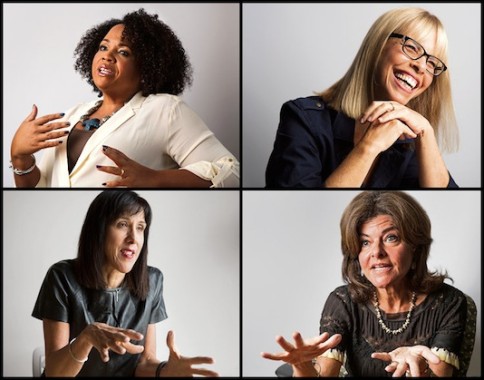Sound familiar?
Cast your mind back to Luce Irigaray’s essay (also book title). Sometimes I think everything important about women was written in the 1970s, and it’s been downhill ever since.
“Female sexuality,” the essay begins, “has always been conceptualized on the basis of masculine parameters.”
That is the sentence that jumped into my mind when I started to read the latest installment on the “gender conversation.” The article is part of a column called the “Corner Office” and it typically deals with the attitudes and beliefs of “top executives.”

In this case the author focused on four women about leadership styles, and reports “frustration with the stubbornly low number of women in executive suites.” I was interested to learn that having an executive suite―emphasis on suite, presumably―says volumes about your standing in a given company: the next step, I presume, after the office with a window and a corner office. (I wonder if it also means your own bathroom.)
The women interviewed (including as an add-on an interview with Janet Yellen) all sound completely intelligent and thoughtful (one even quoted Adrienne Rich about dutiful daughters), but mostly the women accept, however reluctantly, that success entails negotiating with the status quo―the way things are, those “masculine parameters.” Only one woman seems proactive. When asked what steps women can take to have their voices heard, Doreen Lorenzo reports on strategies worked out in women’s groups that meet after work. I especially like one that deals with what to do if “you’re treated like a secretary.” Say something like “We’re going to end the conversation until you listen to me. If you can’t listen to different opinions, we shouldn’t be having this meeting.” I can think of many times I would have liked to say that when I was a young, untenured faculty member.
Readers were invited to give their own advice before the column appeared. In a side bar, several of the responses are cited. My favorite awful recommendation could have come straight from the columns of Seventeen magazine from the 1950s. How can girls become more popular? Get more dates? “My honest advice for women early in their careers is to ‘play the game.’ What I mean is, engage in banter. Get to know what your superiors are into, and be able to engage with them in conversation about those topics.” Sound familiar? Learn to discuss baseball, cars. Be interested in what HE is interested in.
The fly in the ointment of my argument, of course, is that Irigaray posited a universe (however utopian or rhetorical) in which women would live in a world shaped by their values. Not exactly the business world.
Three female Republican women have joined forces, despite their overall low numbers, to come up with a viable deal to break the deadlock created by the partisan divide: Susan Collins, Lisa Murkowski, and Kelly Ayote. Despite their ideological differences, they found a way to join forces: “we are used to working together in a collaborative way.” Macho McCain uttered, jokingly, it seems, the predictable reaction: “The women are taking over.” But the point here, it seems to me, that the women are proceeding differently, in part because they decided to rise above the status quo, despite their minority numbers.
I doubt that any of these competent women would like to see their actions described as due to the parameters of female sexuality more than male. Irigaray would probably make them shudder. But without having to proclaim that they expressed themselves through a parler-femme—women’s language, not to mention labia—they took action without waiting for the status quo to sink any lower.
If you add to that the winners of the Nobel, Alice Munro, and the Man Booker prize Eleanor Catton—the youngest ever– perhaps some things are changing for the better.
